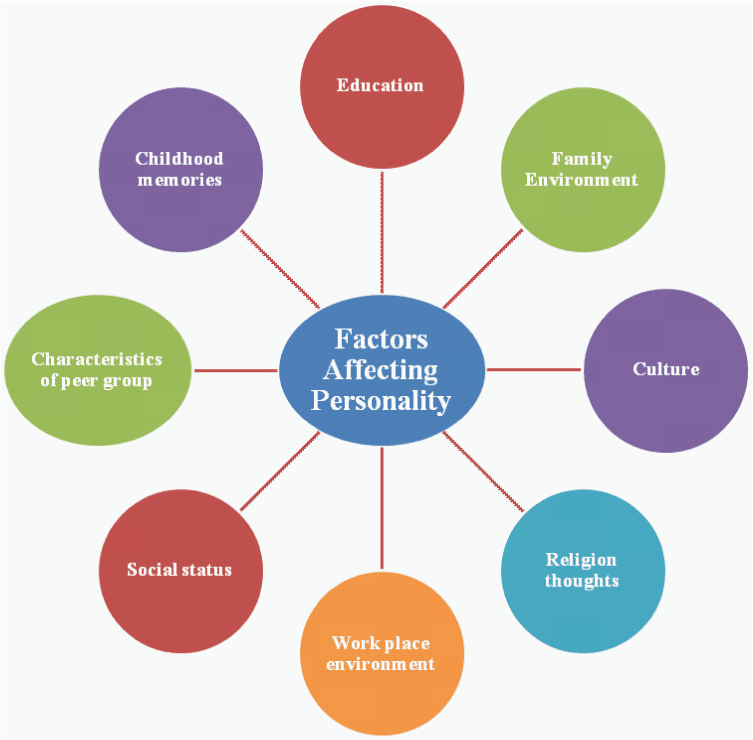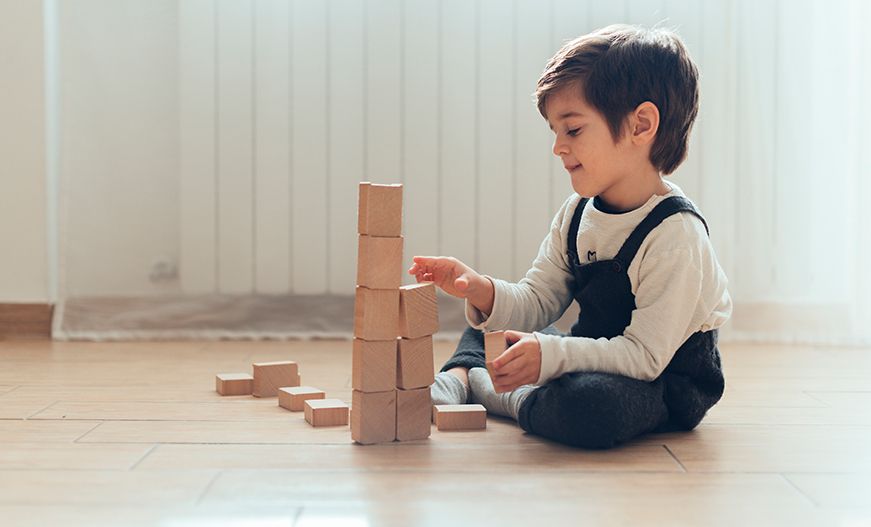Key Factors That Influence Personality Development in Children
Last Updated At: 16 Jul 2025
8 min read

Table of Contents
- What Is Personality Development in Children
- Top 10 Factors That Influence Personality Development in Chi
- How PlanetSpark Helps in the Personality Development of Kids
- Additional Factors Shaping a Child’s Personality
- Why Parents Need to Be Actively Involved
- Stages of Personality Development in Children
- What Happens If Personality Development Is Ignored
- Conclusion
- FAQs
Every child is born with a unique personality. However, this personality does not emerge in full bloom - it is shaped over time by various internal and external influences. The journey of personality development in children begins early and continues as they grow, interact, and learn from the world around them.
Understanding the factors that affect personality development of a child is essential for parents, teachers, and caregivers. With the right support, guidance, and environment, children can grow into confident, expressive, and emotionally intelligent individuals.
In this blog, we’ll explore the key factors that influence personality development and how parents and programs like PlanetSpark can nurture this growth effectively.
What Is Personality Development in Children
Personality development refers to the process by which a child’s thoughts, feelings, behaviors, and emotional patterns are shaped and refined. It includes various traits like:
Confidence
Communication skills
Social behavior
Emotional intelligence
Decision-making ability
Self-discipline
It is not about changing who a child is, but about helping them become the best version of themselves - socially, emotionally, and intellectually.
To dive deeper into the concept, visit our blog on Personality Development for Kids.
Top 10 Factors That Influence Personality Development in Children

1. Family Environment
The home is the first learning space for a child. The way parents communicate, express emotions, and handle stress sets a model for the child. A nurturing environment helps build trust, empathy, and self-confidence.
2. Parenting Style
Children raised with authoritative parenting - a balance of warmth and structure - tend to have higher self-esteem and better emotional control.
Authoritarian: Rigid rules, little warmth (can lead to fear or low confidence)
Permissive: Too lenient, lack of structure (can lead to impulsivity)
Neglectful: No involvement (can hinder emotional growth)
Authoritative: Rules + warmth (ideal for positive development)
3. Education and Learning Exposure
Education plays a vital role in developing intellectual and emotional traits. Schools that encourage creativity, self-expression, and collaborative learning help shape resilient and confident individuals.
PlanetSpark integrates personality development with academics through Personality Development Courses for Kids to build well-rounded communicators.
4. Peer Interaction
Interacting with peers helps children learn:
Social norms
Cooperation
Conflict resolution
Teamwork
Children who engage in group activities, discussions, and play are more likely to develop social confidence and empathy.
5. Communication Skills
Children who are taught to express their thoughts and emotions grow into articulate and self-aware individuals. The way a child speaks, listens, and responds influences how others perceive them - and how they perceive themselves.
PlanetSpark’s Personality Development Training includes structured communication modules to boost public speaking and conversational fluency.
6. Emotional Environment
Children thrive in emotionally stable environments. Excessive stress, parental conflicts, or trauma can severely impact their self-esteem, behavior, and emotional intelligence.
Encouraging children to talk about their feelings and modeling emotional balance helps in shaping a secure personality.
7. Media and Technology Exposure
Children today are heavily influenced by what they see online or on TV. Educational, age-appropriate content can enhance learning, while overexposure to violence or unrealistic beauty standards can distort self-image and behavior.
Monitor screen time and discuss online content openly with your child to build media literacy.
8. Personality Development Programs
Specialized courses like those offered by PlanetSpark focus on:
Leadership skills
Stage presence
Expressive reading
Creative thinking
Interview readiness
These programs offer structured activities that help children face real-world challenges with courage and confidence.

9. Teachers and Mentors
Educators play a vital role in personality development. Supportive, patient, and engaging teachers make students feel heard and valued, which directly boosts confidence and curiosity.
A teacher who praises effort over results encourages a growth mindset - a critical trait in confident individuals.
10. Physical and Mental Health
A child’s health significantly impacts their energy, mood, and self-esteem. Poor nutrition, lack of sleep, or unaddressed mental health issues can delay personality development.
Healthy children are more likely to be active, expressive, and socially involved.
How PlanetSpark Helps in the Personality Development of Kids

PlanetSpark has transformed the lives of 100,000+ students by focusing not just on academics but also on personal growth.
Curriculum Backed by Child Psychology
The curriculum is created by experts in child development, ensuring age-appropriate progression in personality traits.
Real-World Application
Kids learn through debates, storytelling, elocution, role play, and presentations, making them confident speakers.
Progress Reports and Personalized Feedback
Parents receive regular updates and fluency assessments that track progress in communication and behavior.
Expert Trainers
All PlanetSpark trainers are certified, experienced, and trained to motivate shy, introverted, or expressive learners alike.
Additional Factors Shaping a Child’s Personality
While we’ve discussed core elements like family, parenting, and communication, several nuanced factors often go unnoticed but significantly contribute to the personality development of a child. Let’s explore them.
Hobbies and Extracurricular Activities
Hobbies act as mirrors to a child’s inner world. Whether it’s drawing, music, coding, chess, or sports, children express themselves, build focus, and develop identity through what they enjoy doing.
Encouraging your child to explore multiple interests allows them to:
Discover their strengths
Build discipline and dedication
Manage failure and success gracefully
Develop a sense of purpose
Creative hobbies also enhance imagination and innovation, two essential traits for future success.
Influence of Siblings and Extended Family
Siblings can play the role of companions, role models, or even healthy competitors. In households with multiple children, sibling dynamics contribute to:
Learning negotiation and compromise
Building empathy
Gaining conflict resolution skills
Similarly, time spent with grandparents and other family members adds emotional richness and value-based learning.
A supportive family ecosystem - where each member interacts meaningfully with the child- creates emotional security, which is the foundation for strong personality traits.
Cultural and Social Influences
A child’s cultural background affects their worldviews, behaviors, and beliefs. Festivals, traditions, moral stories, and community rituals expose them to shared values like respect, gratitude, and responsibility.
For example:
Children from storytelling-rich cultures often have stronger communication skills
Kids who participate in community volunteering may develop empathy and leadership early on
Exposing children to multicultural experiences also nurtures adaptability and acceptance, key personality traits in today’s globalized world.
Real-World Exposure and Responsibility
Giving children small responsibilities at home or school helps them develop maturity, reliability, and accountability. It could be as simple as:
Watering plants
Packing their school bag
Helping with grocery lists
Managing a daily routine chart
These tasks build a sense of ownership and pride in their actions. Children who are trusted with responsibilities from a young age often grow into decisive and dependable individuals.
Role of Language and Thought
Language shapes thought, and thought shapes behavior. The kind of language children hear and use regularly influences their emotional and intellectual growth.
Using:
Positive affirmations
Emotionally intelligent words (“I feel upset,” “I’m proud of myself”)
Empathetic statements (“How do you feel?”) ... create a reflective and expressive personality.
At PlanetSpark, our instructors use emotionally rich, age-appropriate language to model respectful and impactful communication in every session. These additional influences, when recognized and nurtured, can make a remarkable difference in how a child sees themselves and interacts with the world. They are the soft threads that, when woven together, shape a confident, compassionate, and well-rounded personality.

Why Parents Need to Be Actively Involved
Parental encouragement and participation have the most profound impact on a child’s personality. Be present, listen without judgment, encourage curiosity, and recognize your child’s individuality.
Tips for Parents:
Set routines and boundaries
Use positive discipline
Acknowledge effort, not just results
Encourage independent decision-making
Offer choices, not commands
Stages of Personality Development in Children
| Age Group | Focus Areas |
|---|---|
| 0-3 Years | Emotional bonding, sensory development |
| 3-6 Years | Social interaction, play, basic communication |
| 6-12 Years | Learning responsibility, developing empathy |
| 12+ Years | Self-identity, emotional control, leadership |
Each stage needs attention, patience, and structured support.
What Happens If Personality Development Is Ignored
Neglecting personality development can result in:
Low self-esteem
Poor social skills
Lack of confidence
Difficulty managing emotions
Trouble communicating effectively
While academics are crucial, personality is what helps children succeed in real life.
Conclusion
The factors affecting the personality development of a child are diverse and deeply interconnected. From home and school environments to structured personality development courses, each element plays a vital role in shaping who your child becomes.
PlanetSpark’s expertly curated programs ensure your child isn’t just learning to communicate - they’re learning to lead, empathize, and thrive. Start early, be involved, and let your child’s true personality shine.
FAQs
1. At what age should personality development start in children?
Ans. Personality development begins as early as infancy. However, structured programs can start from the age of 4 to guide the child effectively.
2. How can I improve my child’s personality at home?
Ans. Be a good role model, communicate openly, set routines, encourage hobbies, and expose them to situations that build confidence.
3. Is personality inborn or shaped by environment?
Ans. While children are born with certain temperaments, their environment, upbringing, and experiences play a much bigger role in shaping personality.
4. Can shy children benefit from personality development courses?
Ans. Yes! Such courses are especially helpful for shy or introverted children, as they offer a safe space to practice speaking and gain confidence.
5. How does PlanetSpark differ from other development programs?
Ans. PlanetSpark combines live interaction, expert mentoring, personalized feedback, and fun activities to make personality development engaging and results-driven.
Personalized Communication Report
Record a video to get a AI generated personalized communication report for your child
Select Learner's Class

Hi There, want to try these
tips for your child with
LIVE with our expert coach?
Let's check your child's
English fluency
